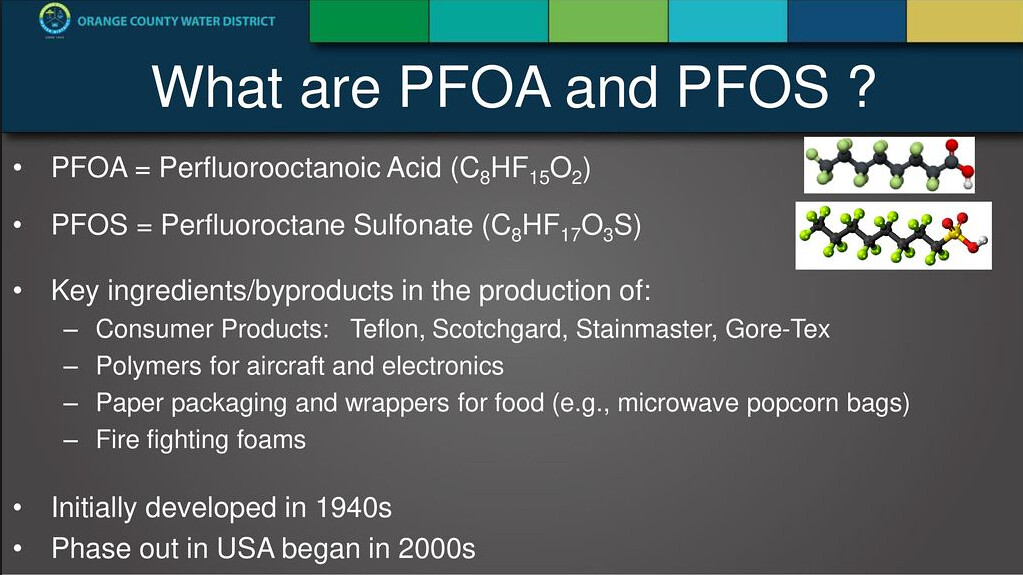Source: SlidePlayer
Last week, I wrote a blog about an emerging controversy surrounding a report about the two dangerous chemicals -- PerfluoroOctanoic Acid (PFOA) and PerfluoroOctaneSulfonic Acid (PFOS) which has been suppressed by the Administration. As a result of learning about that report and the suppression by the Trump Administration, Congress informed by the Department of Defense (DOD) and the Environmental Protection Agency (EPA) that an explanation is needed about this critical issue. Why is this critical? Do you like turning the tap on to get 'clean' drinking water? If the answer is yes, then the emerging information will be of critical importance to you.
This morning, emails which were obtained through the Freedom Of Information Act by the Environmental Defense Fund (EDF) shows the initial problems with the emerging issue. The following introduction to the information obtained by the EDF was emailed out this morning by 'Politico Energy' - shown below:
PRUITT'S CHEMICALS PROBLEM GETS BIGGER: Several major chemical companies have told federal regulators they planned to have hundreds of pounds of hot-button chemicals dumped daily into rivers that an environmental group warns could be used as drinking water sources. The Environmental Defense Fund obtained documents showing that chemicals companies estimated that paper mills making pizza boxes and other food packaging would be discharging as much as 225 pounds of the chemicals into nearby waterways each day. Companies such as Chemours and Daikin America submitted those estimates to the Food and Drug Administration to support applications to sell chemicals related to PFOA, which is linked with thyroid disease and certain cancers, for use in food packaging. The FDA has approved applications from six companies in recent years and the dumping could now be taking place at paper mills across the country.But here's the catch: EDF says discharges of the PFOA-related chemicals are likely unregulated, and there is no public information about which plants are using these chemicals and which waterways they're being discharged into. That means that drinking water utilities that draw their water just downstream might not know to treat for the contaminants, and state regulators wouldn't know to set limits for the chemicals in the permits they issue the mills. EDF estimates that in many major waterways with pulp mills along them, like the Cape Fear River in North Carolina, those discharges would put concentrations of the chemicals well above EPA's health advisory level for PFOA. "If you're not told that these chemicals are used in the facility, you don't know to set a limit, you don't know to do testing," said Tom Neltner, EDF's chemicals policy director.The revelations come as EPA Administrator Scott Pruitt faces fierce questions from lawmakers on his top lieutenant's efforts to block a health study produced by HHS that was poised to find that PFAS chemicals can pose a danger at lower levels than EPA has previously said were safe. On Friday, three Republicans, including a member of House GOP leadership and a key ally of President Donald Trump, joined with 10 Democrats to demand that Pruitt release the study and explain the brouhaha. A planned leadership summit on PFAS chemicals kicks off Tuesday at EPA's headquarters.
The information obtained by the EDF tells a different story than just suppressing a 'report about dangerous chemicals.' Dumping cancer causing chemicals into potential water sources should set off 'red alarms' at the EPA. Just look at the response so far -- not much concern after receiving e-mails about dumping large amounts (high concentrations) of dangerous chemicals into water sources.
The other disturbing news contained in the excerpt has to do with 'who is in charge?' of the water sources. As noted in the excerpt above, the EPA did nothing in response to the information obtained/sent by the corporations regarding the discharging of high concentrations of chemicals into water sources. In the event that is the case, who can local water districts turn to in order to ensure that the water coming into a source is safe.
Luckily, congress is reaching out and asking questions on our behalf. Don't be afraid to reach out to your local politician (elected senator) and express concern for this issue. Providing safe access to water should be each politician's top priority as a public health issue. Each of us deserve safe drinking water. As I find more information out regarding this issue, I will keep providing more updates on the important matter.
Related Blog Posts:
Congress Asks Defense Department and Environmental Protection Agency about Dangerous Chemicals
Science Topics, Thoughts, and Parameters Regarding Science, Politics, And The Environment!
Why Would A President Choose To Deregulate The Environmental Protection Agency?
What Does America Drinking Water Look Like With Little-to-No Regulation?
Why Is The Science March Important?
Write Your Elected Official And They Will Write Back?
Should Pollution Concern Us?
What Promises Did President Trump Make Science Research During His Campaign?
Can The President Prevent The Public From Learning About Scientific Research???
The Biotech Industry Takes A Stance Against Immigration Ban
The Biotech Industry Takes A Stance Against Immigration Ban
STEM Outreach Is Useful For All Participants!
20 Questions Politicians Answer Regarding Science Issues
How Do Chemists Discover New Drugs? A Brief Introduction!
A Perfect Example Of Why Science Outreach Is Critical: Science Needs Simplification!

No comments:
Post a Comment